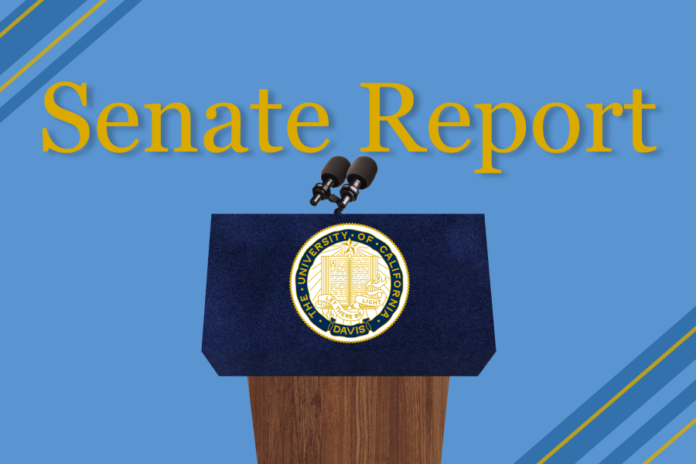Gary May responded to several questions from members of the public about the ongoing academic workers strike
By SONORA SLATER — campus@theaggie.org
Vice President JT Eden called the Nov. 21 meeting to order at 6:01 p.m., before calling roll and reciting the UC Davis Land Acknowledgement. The meeting was held on a Monday rather than a Thursday due to the scheduling conflict of Thanksgiving break.
Next, UC Davis Chancellor Gary May presented to the Senate table and the approximately 20 members of the public who attended the meeting. He first gave a short introductory speech before taking alternating questions from senators and members of the public for the next half hour.
Joshua Mason, a fifth-year Ph.D. candidate in the Department of Sociology and a teaching assistant, asked May if he would be willing to make a more direct statement in support of the ongoing academic workers strike, as compared to the statement he released on Nov. 18.
“I love what I do,” Mason said. “Every day, I get the chance to teach students the things that I find truly important and that I think make people better. But unfortunately, I don’t like my pay. I was kind of disappointed [that] I didn’t see a substantive statement on where you stand as a public official on the strike.”
May said that he stands by the statement that he made previously and recognizes the right of UC workers to strike, but that he believes making a more biased statement as a leader on campus “could interfere with or undermine the negotiations that are ongoing.”
Sarah Gooding, a sixth-year Ph.D. candidate in neuroscience and a graduate student researcher, referenced her current condition as a pregnant woman and asked May to consider the difficulty of simultaneously doing research for the university and starting a family.
“I [contribute] a ton to this university, and I would like to continue doing that,” Gooding said. “But I am 36 weeks pregnant. We came to Davis because it was sold to us as a wonderful place to start a family, but the realities of the current costs of childcare and the general cost of living are making it potentially impossible.”
In response to Gooding, and as a general statement, May said that he hears the concerns of the student workers, but that he doesn’t have much power in negotiations.
“I wish I was a little more empowered to make a decision,” May said. “But I’m not. I’m really the middleman in this situation.”
To close out the presentation, May encouraged students to reach out to him with other concerns or questions they might have.
“We don’t have to wait for opportunities like this to have conversations,” May said.
At 6:44 p.m. the questioning period ended, and the Senate took a break.
Eden called the meeting to order again at 7:04 p.m. and called roll. Next on the agenda was the confirmation of a new member of the Judicial Council, but as of the meeting time, the role had not been filled.
There were applicants for the position, but interviews had not yet taken place, according to Senate President Pro Tempore Gaius Ilupeju. Ilupeju went on to say that the seat would be filled by the next Senate meeting on Nov. 31.
The Senate then moved into public comments.
Senator Stephen Fujimoto encouraged the Senate table to continue showing up to the picket line for the duration of the strike. President Radhika Gawde said that she has been in talks with the Academic Senate about adjusting undergraduate course formats and requirements in response to the strike.
The Senate table next moved into hearing quarterly reports. Third-year political science major and Chairperson Mehalet Shibre gave the quarterly report for the Ethnic and Cultural Affairs Commission (ECAC) and the DREAM Committee.
This quarter, ECAC has been focused on hiring commissioners, according to Shibre, as well as holding a decompression painting event. In the future, ECAC is planning to post a vacancy for a DREAM Committee Chairperson soon and work toward bringing an Ethnic Studies course requirement to campus.
The Student Health and Wellness Committee (SHAWC) quarterly report was next on the agenda, but as the presenter for SHAWC was not there yet, the Senate instead heard the Housing Advising for Undergraduate Students (HAUS) quarterly report, given by second-year gender, sexuality and women’s studies major Annette Gutierrez.
HAUS completed several interviews this quarter to help grow their team, according to Gutierrez, and met with Davis property managers about the 2023 Housing Fair, which will take place on Feb. 8. The committee’s main goals for next quarter are to successfully plan and run the Housing Fair, Gutierrez said, as well as work on a storage unit project that would offer space to students to store their belongings temporarily while they move.
The Senate table then moved into elected officer reports, where they were given the option to either give a report or simply pass due to the modified meeting schedule, as only two work days had passed since the previous meeting.
Fourth-year economics major and Chairperson Hibah Shafi then gave the SHAWC quarterly report. According to Shafi, the committee has been working on several projects throughout this quarter, including getting safer sex product dispensers installed in the MU, working with the mayor of Davis to write an ordinance updating the definition of stalking to make airtagging a crime and working within Greek Life to promote consent.
Due to a vacancy on the Judicial Council persisting for more than four weeks, the Senate had no previous legislation to review and did not vote on any legislation.
After approving past meeting minutes, the Senate moved into open forum, where Fujimoto encouraged Senators to be more involved with supporting their respective adopted committees.
Eden adjourned the meeting at 8:21 p.m.
Written by: Sonora Slater — campus@theaggie.org




